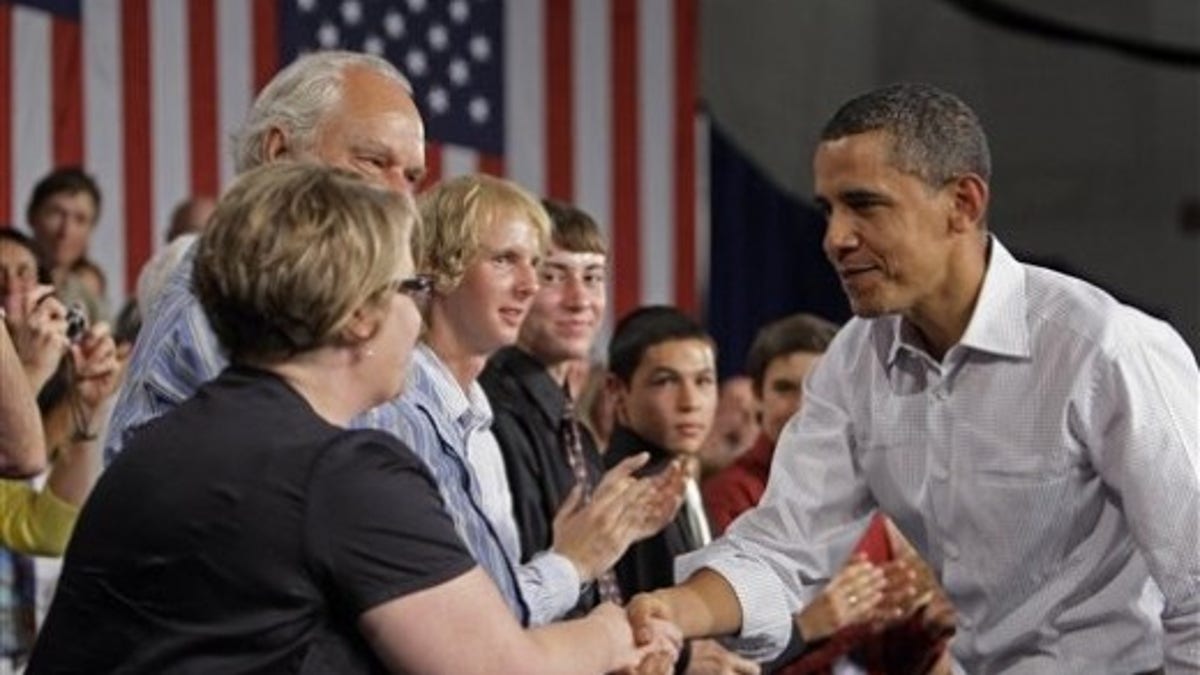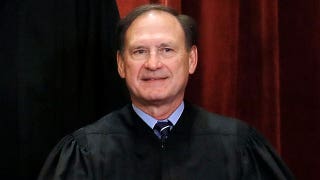
AP
Should health care be about activism and adrenaline, or about actual health and wellness? Perhaps we can agree that health care should not be about reckless driving--because car wrecks bad for America's health, and costly, too. Please keep reading, as I report, and you decide.
On Sunday, The Washington Post published a front-page story detailing the efforts of activists working on behalf of Barack Obama's health care plan. It was a friendly piece, even if it did include a damning admission about reckless driving on the part of Jeremy Bird, deputy director of Organizing for America, the successor organization to the Obama presidential campaign. The Post introduced Bird like this:
The last three years had unfolded in an unrelenting series of what Jeremy Bird called Big Moments, and here began the latest on a sweltering afternoon earlier this month. Another rental car, another unfamiliar highway, another string of e-mails sent from his BlackBerry while driving 70 mph.
Whoa, Jeremy! "Another string of e-mails sent from his BlackBerry while driving 70 mph"? Does your mother know about this, to say nothing of your fellow motorists? One must say for Bird, the excitement associated with campaigning seems to be an end in itself. "I don't know about you," he says to a colleague in The Post story, but I'm running on adrenaline right now. I love this feeling that we're on the verge of something crucial."
Yet for all that reckless driving and adrenaline-izing, it would appear that Obamacare is receiving a thumbs-down in the coliseum of public opinion. And now new concerns, about the ethics of White House adviser David Axelrod, and of outside adviser Tom Daschle, and whether or not the White House has been "spamming" out e-mails--a story broken by FOX News--threaten to further unhinge the Obamans.
Indeed, in their wild rush to get a health bill through Congress, the speed demons at the White House seem to have ignored the road map used by successful presidents in the past. The Obamans knew they didn't want to repeat the "Hillarycare" debacle of 1993-4, but it seems they hadn't learned the proper lesson from the Clinton administration. The Obamans looked back at Hillarycare and said to themselves, "The mistake that Hillary Rodham Clinton made was to write a 'health insurance reform' bill at the White House and then send it to Congress. So we will do it completely differently: We will will let Congress write a 'health insurance reform' bill, and then we'll sign it!" But what both the Hillaryites and the Obamans didn't grasp is that the problem is "health insurance reform" itself.
While a few fans of big government savor the idea of a government takeover of health care--which is where "health insurance reform" would most likely end up--it's a tedious and boring topic to most people. That is, except when they are finally forced to look into it. And then, after they start paying attention to the fine print of "health insurance reform," they tend to get scared and angry. That's happened twice now, in 1993 and then again in 2009. It doesn't matter whether the White House writes the bill, or Congress writes the bill; people just don't like the idea of "health insurance reform."
So are we stuck? If two presidents, Clinton and Obama, fail on "health insurance reform," does that mean that the president can do nothing?
No. Because two earlier presidents, one from each party, proved that a chief executive who focuses on health, as opposed to "health insurance reform," can not only survive politically, but also thrive politically.
Yes, once upon a time, presidents worried about the actual life's blood of our health, as opposed to the dry details of "health insurance reform." If Obama, and Clinton before him, had known a little more about past successes of U.S. history, they would have done better in their own legislative campaigns. So let's go back in time to the days when presidents wanted to cure disease, as opposed to tinker with process.
The year was 1938. President Franklin D. Roosevelt, having rejected calls to include health care inside his landmark Social Security legislation, passed three years before, chose a new direction for health policy. He launched the National Foundation for Infantile Paralysis to combat polio, then a major scourge that crippled or killed millions. The effort--"Send your dime to President Roosevelt!" was a popular cry--soon became known as the March of Dimes.
The March of Dimes was a huge winner for FDR. It was the sort of public-private partnership that all Americans could rally behind; it was one reason why Roosevelt was re-elected to a third term in 1940, the first and only president to be so victorious. OK, that's the political angle--what about the health angle? Well, nobody said it would be easy to thwart polio. Roosevelt died in 1945, but the work continued. Finally, in 1955, Jonas Salk, working for the March of Dimes at the University of Pittsburgh, was able to announce the vaccine.
Can we say "mission accomplished" and mean it?
Decades later, President Richard Nixon proposed a "war on cancer." As Nixon said in his 1971 State of the Union address:
The time has come in America when the same kind of concentrated effort that split the atom and took man to the moon should be turned toward conquering this dread disease. Let us make a total national commitment to achieve this goal.
America has long been the wealthiest nation in the world. Now it is time we became the healthiest nation in the world.
And you know what? The "war on cancer" was a winner. A Democratic-controlled Congress was only too happy to pass huge new appropriations for the National Cancer Act of 1971, which the Republican president signed into law on December 23 of that year.
And Nixon, of course, was thumpingly re-elected in 1972.
But wait a second, one might say. Politics aside, did the "war on cancer" work? The short answer is, "Yes, we have won many battles against cancer, but but not as quickly as we would like. The full war has yet to be won." Is that an acceptable answer? Have we gotten our money's worth over the last four decades? People can differ in their answers to those questions, but it is true that treatment for many kinds of cancer has improved dramatically. For example, colorectal cancer and lung cancer are still big killers, but survival rates for those cancers have increased sharply. And for some some other types of cancer, such as Hodgkin's Lymphoma, some 98 percent of U.S. cases are cured.
But of course, sometimes wars take a long time. There was the Seven Years' War, and the Thirty Years' War, and even the Hundred Years' War.
There's no guarantee that we can defeat cancer, only the earned confidence that comes from the demonstrable march of science over the centuries. We might take comfort, for example, in our collective victory over another big killer of yesteryear, smallpox. The first vaccine for smallpox was developed in 1796, but it was not until 1979 that the World Health Organization declared the disease to be completely eradicated. The war against smallpox took 183 years to win, from the first gun to the final victory, but it was worth it.
Roosevelt vs. polio. Nixon vs. cancer. Whatever one thinks of those two presidents, it's true that millions of people, in America and around the world, owe their lives to the great medical science that those two men unleashed. For both the 32nd and 37th presidents, that's a powerful legacy.
And so to today: What if Obama had said earlier this year, "I am going to cure Alzheimer's"? And said it with the sort of Kennedy-esque flourish that we know he is capable of? Would such a proposal have been popular? Of course it would have been popular; even partisan Republicans would not have been able to complain too much. After all, everyone is at risk of Alzheimer's. We are all better off if it gets cured. And if that hypothetical anti-Alzheimer's campaign had worked somewhere down the road, then Obama's positive place in history would have been secure, just for that one achievement.
Obama is a smart man, but it's possible he never even knew that his predecessors, Roosevelt and Nixon, had enjoyed so much political success by launching disease-specific health crusades. At the At the urging of his advisers, he simply decided to focus on "health insurance policy." And now he is doubling down.
That's what happened to Herbert Hoover. Beginning in 1929, he played a bad policy hand, and then stolidly stuck with it, even after the Crash and the onset of the Depression. He rode his own stubbornness all the way to the end of his one-term presidency.








































